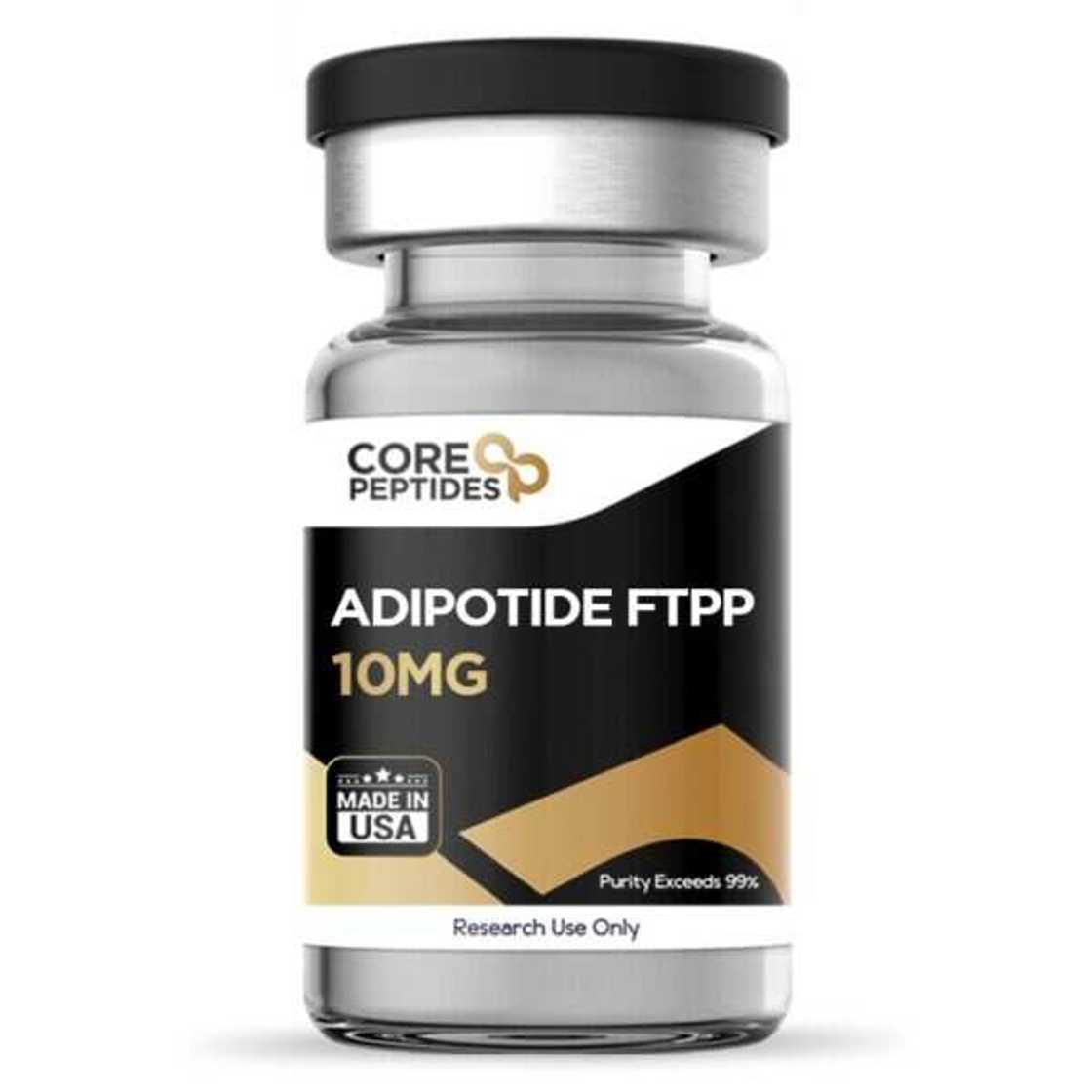Adipotide FTPP (Fat-Targeted Proapoptotic Peptide) and Adipose Tissue Studies
Research suggests Adipotide peptide, or FTPP (Fat-Targeted Proapoptotic Peptide), is a synthetic peptidomimetic. Peptidomimetics are artificial compounds with the same structural domain as a natural protein. Studies suggest that because of its potential ability to bind to the protein receptor prohibitin, Adipotide is also known as Prohibitin-targeting peptide 1 (TP01). White fat cell apoptosis is induced; as a result, it has been examined by researchers for its potential proapoptotic effects on adipose tissue.
Adipotide peptide has been suggested to significantly reduce body fat, lower body weight, and enhance several metabolic indices in animal experiments by causing targeted apoptosis in laboratory conditions.

Source: UGC
Adipotide Peptide: Mechanism of Action
Researchers speculate Adipotide binds to the receptors of ANXA2 (annexin A2) and may prohibit it from exerting its action. Different cell types express either of these receptors; however, immunohistochemistry reveals that in white adipose tissue, they work together to create ANXA2-prohibitin receptor networks. [i]
The importance of these receptors in controlling fatty acid transport in white adipose tissues has been posited via extensive research. Reducing fatty acid intake by white adipose cells causes their size to increase when the ANXA2 protein is inhibited [ii].
In contrast, prohibitin is a membrane-associated protein with several roles, including perhaps controlling cell survival and proliferation. It moves back and forth between the cell membrane and the nucleus, where it might initiate apoptosis.
The amino acid sequence of Adipotide is particularly interesting: GKGGRAKDC-GG-D(KLAKLAK)2. The 9-amino acid sequence CKGGRAKDC has a specific affinity to the ANXA2-prohibitin receptor system, which is present in the blood arteries that nourish white adipose cells [iii]. Upon internalization through receptors, (KLAKLAK)2 may damage mitochondrial membranes and trigger apoptosis.
Scientists hypothesize that Adipotide's potential ability to bind to prohibitin in white adipose vasculature has been linked to its potential to induce apoptosis and ultimately eliminate white adipose tissue.
Studies have suggested that Adipotide peptide and other peptidomimetics may successfully target intra-organ fat, such as in fatty liver disorders, and decrease subcutaneous and visceral fat. [iv]
Adipotide Peptide Properties
Mice, rats, and rhesus monkeys have been used to study the peptidomimetic's metabolic properties and ability to cause weight reduction. After 28 days of Adipotide peptide presentation, obese rats appeared to lose 30% of their body weight [v]. Even though the animals' leptin levels were reduced, the presentation appeared to reduce their hunger considerably. In addition, there seemed to be no change in the animals' metabolic rates.
Researchers speculated that Adipotide peptide may have improved metabolic function as early as the third day of presentation, days before the mice examined saw any significant weight loss. After testing Adipotide on obese mice, Kim et al. suggested that it "rapidly and potently improved the glucose tolerance of obese mice in a weight- and food intake-independent manner."[vi] Triglyceride and insulin levels appeared dramatically lowered by the peptidomimetic as well.
Studies suggest Adipotide peptide presentation may have induced targeted apoptosis in white adipose tissue blood arteries in obese rhesus monkeys [vii]. Therefore, during the first month of presentation, the animals appeared to show reduced weight and improved insulin sensitivity. Dual-energy x-ray absorptiometry and magnetic resonance imaging suggested a considerable loss of white adipose tissue.
Adipotide Peptide and Prostate Cancer Research
Male test subjects with prostate cancer may also benefit from the loss of white fat. This is the case because research has linked large levels of white fat to worse prostate cancer outcomes. [viii]
Research models with castrate-resistant prostate cancer with no other therapy choices were studied to see how one cycle of Adipotide peptide may affect their condition.
Researchers suggest that some subjects completed the full study cycle; however, the experiment was cut short due to a request from the primary investigator [ix], [x].
Conclusion
Further investigation and clinical testing of the Adipotide peptide as an anti-obesity compound is needed. The suggestion that Adipotide peptide may exert impact on both subcutaneous and visceral fat is promising. One of the primary contributors to systemic inflammation, hypercholesterolemia, insulin resistance, and other related conditions is visceral obesity. These may increase the likelihood of developing cancer, cardiovascular disease, diabetes, or a stroke.
Research suggests that Adipotide peptide may reduce the risk of these severe illnesses in obese test subjects by lowering visceral body fat and energy consumption. In addition, studies suggest it may improve the prognosis for male test models with prostate cancer that have not responded to conventional treatments.
Researchers can only hope that further studies into this peptidomimetic will reveal its full potential and provide yet another instrument to combat the epidemic of obesity and its linked disorders. Adipotide FTPP for sale is only available for scientists or licensed professionals looking to test this product in contained laboratory environments.
References
[i] Staquicini FI, Cardó-Vila M, Kolonin MG, Trepel M, Edwards JK, Nunes DN, Sergeeva A, Efstathiou E, Sun J, Almeida NF, Tu SM, Botz GH, Wallace MJ, O’Connell DJ, Krajewski S, Gershenwald JE, Molldrem JJ, Flamm AL, Koivunen E, Pentz RD, Dias-Neto E, Setubal JC, Cahill DJ, Troncoso P, Do KA, Logothetis CJ, Sidman RL, Pasqualini R, Arap W. Vascular ligand-receptor mapping by direct combinatorial selection in cancer patients. Proc Natl Acad Sci U S A. 2011 Nov 15;108(46):18637-42. doi: 10.1073/pnas.1114503108. Epub 2011 Nov 2. PMID: 22049339; PMCID: PMC3219136.
[ii] Salameh A, Daquinag AC, Staquicini DI, An Z, Hajjar KA, Pasqualini R, Arap W, Kolonin MG. Prohibitin/annexin 2 interaction regulates fatty acid transport in adipose tissue. JCI Insight. 2016 Jul 7;1(10):e86351. doi: 10.1172/jci.insight.86351. PMID: 27468426; PMCID: PMC4959783.
[iii] Kolonin MG, Saha PK, Chan L, Pasqualini R, Arap W. Reversal of obesity by targeted ablation of adipose tissue. Nat Med. 2004 Jun;10(6):625-32. doi: 10.1038/nm1048. Epub 2004 May 9. PMID: 15133506.
[iv] Hossen N, Kajimoto K, Akita H, Hyodo M, Harashima H. A comparative study between nanoparticle-targeted therapeutics and bioconjugates as obesity medication. J Control Release. 2013 Oct 28;171(2):104-12. doi: 10.1016/j.jconrel.2013.07.013. Epub 2013 Jul 18. PMID: 23871959.
[v] Kim DH, Woods SC, Seeley RJ. Peptide designed to elicit apoptosis in adipose tissue endothelium reduces food intake and body weight. Diabetes. 2010 Apr;59(4):907-15. doi: 10.2337/db09-1141. Epub 2010 Jan 26. PMID: 20103704; PMCID: PMC2844838.
[vi] Kim DH, Sartor MA, Bain JR, Sandoval D, Stevens RD, Medvedovic M, Newgard CB, Woods SC, Seeley RJ. Rapid and weight-independent improvement of glucose tolerance induced by a peptide designed to elicit apoptosis in adipose tissue endothelium. Diabetes. 2012 Sep;61(9):2299-310. doi: 10.2337/db11-1579. Epub 2012 Jun 25. PMID: 22733798; PMCID: PMC3425411.
[vii] Barnhart KF, Christianson DR, Hanley PW, Driessen WH, Bernacky BJ, Baze WB, Wen S, Tian M, Ma J, Kolonin MG, Saha PK, Do KA, Hulvat JF, Gelovani JG, Chan L, Arap W, Pasqualini R. A peptidomimetic targeting white fat causes weight loss and improved insulin resistance in obese monkeys. Sci Transl Med. 2011 Nov 9;3(108):108ra112. doi: 10.1126/scitranslmed.3002621. PMID: 22072637; PMCID: PMC3666164.
[viii] Allott EH, Masko EM, Freedland SJ. Obesity and prostate cancer: weighing the evidence. Eur Urol. 2013 May;63(5):800-9. doi: 10.1016/j.eururo.2012.11.013. Epub 2012 Nov 15. PMID: 23219374; PMCID: PMC3597763.
[ix] Smith, T. L., Sidman, R. L., Arap, W., & Pasqualini, R. (2022). Targeting vascular zip codes: from combinatorial selection to drug prototypes. In The Vasculome (pp. 393-401). Academic Press.
[x] ClinicalTrials.gov [Internet]. National Library of Medicine (US). 2010 Dec 17 – . Identifier NCT01262664, A First-in-Man, Phase I Evaluation of A Single Cycle of Prohibitin Targeting Peptide 1 in Patients With Metastatic Prostate Cancer and Obesity; 2019 Jan 4; http://clinicaltrials.gov/ct2/show/NCT01262664
[Sponsored]
Source: Legit.ng


